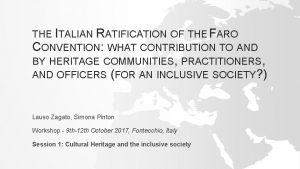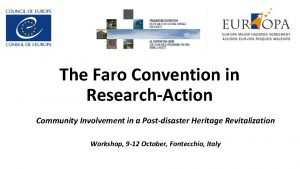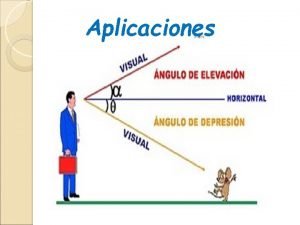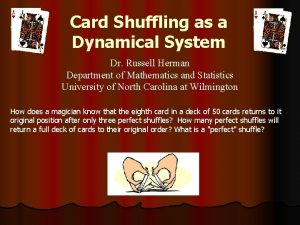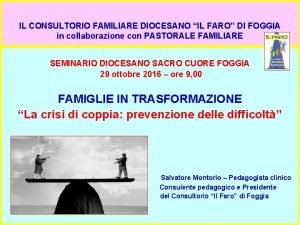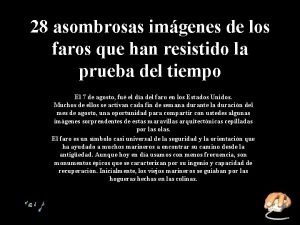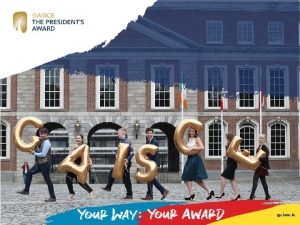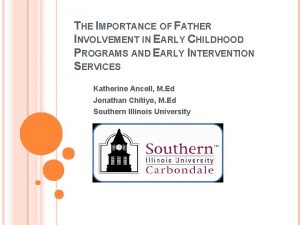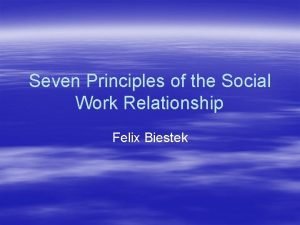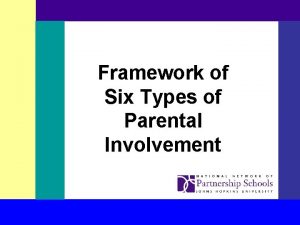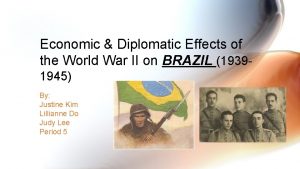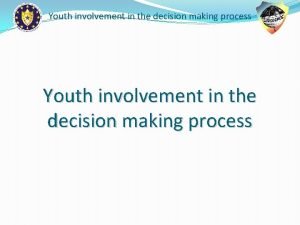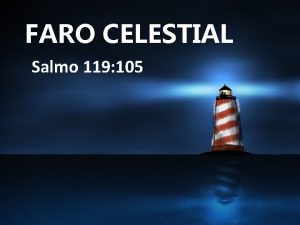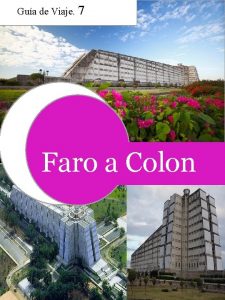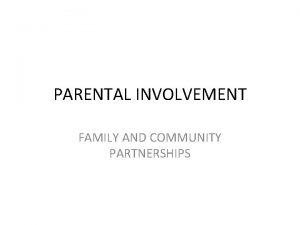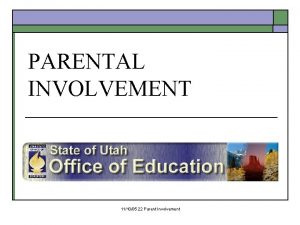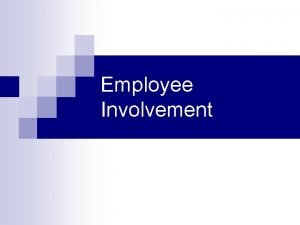The Faro Convention in ResearchAction Community Involvement in













- Slides: 13

The Faro Convention in Research-Action Community Involvement in a Post-disaster Heritage Revitalization Workshop, 9 -12 October, Fontecchio, Italy

The Faro Convention in Research-Action Workshop Presentation (context, participants, programme, expected results) By Dr. Isabelle Brianso & Prosper Wanner

1. Elements of Context § The Faro Convention (FC) aims to stimulate a multicultural heritage community involvement in the European territory; § The FC strengthens the common heritage of Europe (art. 3); § The FC encourages a new model of heritage governance defined as an incubator of practices and uses that should boost local initiatives in strong interaction with political institutions; § The FC points outs fundamental European democratic principals (Human Rights) and innovative concepts; § The FC stresses on an open definition of cultural heritage as a group of “resource” (museums, dances, artefacts, monuments, nature, etc. ).

2. The FC Research-Action Workshop Ø The first Faro Convention Research-Action Workshop in Fontecchio aims: § To develop partnerships with academia, civil society and investigation centres (universities); § To carry out case studies on multi-scales territories (rural, urban), heritage communities (local actors, museums, NGOs, etc. ) and European heritage (culture, nature) on Faro Convention values and principals.

2. The FC Research-Action Workshop Ø The first Faro Convention Research-Action Workshop is focused on post-disaster heritage revitalization: § Fontecchio is a rural place which offers a relevant fieldwork of research-action as a cultural heritage example focuses on preparedness, response and revitalization; § The Faro case studies are research-oriented and based on previous projects supported or related to Co. E programmes (European Cultural Routes, LDPP, COMUS, PCDK, etc. ) that should constitute a significant corpus of fieldwork regarding methodology implemented and research productions (articles, papers, documentaries, conferences, etc. ).

2. The FC Research-Action Workshop Ø The first Faro Convention Research-Action Workshop is focused on post-disaster heritage revitalization: ØTwo main questions to be discussed during the workshop: 1. How Faro Convention can be an instrument of local revitalization ? 2. Which methodology(ies) to implement Faro Convention with communities as a sustainable heritage governance?

2. The FC Research-Action Workshop Ø The first Faro Convention Research-Action Workshop is focused on post-disaster heritage revitalization. ØThree main topics (sessions) will be developed during the workshop: § Session 1 – Heritage in a Societal Change § Heritage and gender issues § Heritage and inclusive society § Session 2 – Heritage as an Ecosystem of Development § Sustainable initiatives to put value on heritage in Europe § Integrated heritage (nature, culture) in rural places

2. The FC Research-Action Workshop Ø The first Faro Convention Research-Action Workshop is focused on post-disaster heritage revitalization. § Three main topics (sessions) will be developed during the workshop: § Session 3 – Make Heritage Accessible § Learn from local community knowledge § Museum: a place of education and diffusion

2. The FC Research-Action Workshop Ø The first Faro Convention Research-Action Workshop is focused on post-disaster heritage revitalization. § Participants from different academic circles (universities, research institutes and centres) and interested civil society organizations (NGOs, museums, associations, etc. ) will present and analyse specific European case studies from various Faro Convention related heritage angles (social development, territorial ecosystem, education) and make recommendations for heritage community involvement in a researchaction process.

3. The Research-Action Workshop Ø Parallel sessions: academics presentation (15 minutes by participant) § Session 1 – Heritage in a Societal Change § Dr Panas Karampampas (EHESS, France) / (Intangible) Cultural Heritage Policies at Times of Crisis in Greece § Prof. Lauso Zagato (Venice University, Italy) / The Italian Ratification of the Faro Convention: what contribution to and by heritage communities, practitioners, and officers (for an inclusive society? ) – [with Dr. Simona Pinton, Venice University] § Ph. D student Manon Collin (Université Catholique de Louvain & Avignon University, Belgium & France) / Migrants at Museum: which social and European meanings ?

3. The Research-Action Workshop Ø Parallel sessions: academics presentation (15 minutes by participant) § Session 2 – Heritage as an Ecosystem of Development § Dr Marie Gaillard (FFECR, France) / The “European Cultural Routes” (ECR): a concrete European action for cultural development ? § Ph. D candidate Matthias Ripp (Brandenburg University, Germany; OWHC) / Heritage-Management at the UNESCO World Heritage Site Regensburg § Ph. D candidate Ángel Portolés-Gorris (Jaume I University, Spain) / An Example of Heritage Communities Network: the Jaume I University of Castellón Patrimoni project

3. The Research-Action Workshop Ø Parallel sessions: academics presentation (15 minutes by participant) § Session 3 – Make Heritage Accessible § Dr Margherita Sani (NEMO, Germany) / Making Heritage Accessible: Museums, communities and participation § Dr Luís Raposo (ICOM-Europe, Portugal) / Communities and Museums in Abandoned Lands § Dr Andrea Sieber (Institut für Unterrichts und Schulentwicklung, Austria) / Make Heritage Accessible: learn from local community knowledge

3. The Research-Action Workshop § Parallel sessions led by Marco Polvani (session 1 - Heritage in a Societal Change), Alessio di Giulio (session 2 - Heritage as an Ecosystem of Development) and Valeria Pica (session 3 - Make Heritage Accessible); § Participants are invited to work on methodology recommendations (Charter) during collective sessions; § Participants are invited to work on Faro implementation (Charter) during collective sessions; § Participants are invited to work on collective reflexion to prepare “ 2018, the European Year of Cultural Heritage”; § Workshop follow-up: academics will be asked to produce a reflexion paper (10, 000 characters) based on discussions and collective work.
 Faro convention
Faro convention Faro
Faro Un grillo se encuentra a 10m del pie de un arbol
Un grillo se encuentra a 10m del pie de un arbol Faro shuffle java
Faro shuffle java Consultorio familiare foggia
Consultorio familiare foggia Faro de tevennec
Faro de tevennec Lisa faro
Lisa faro Gaisce bronze record sheet
Gaisce bronze record sheet Father involvement activities
Father involvement activities Felix biestek
Felix biestek Oral deffinition
Oral deffinition Theoretical framework about parental involvement
Theoretical framework about parental involvement Brazil ww2 involvement
Brazil ww2 involvement Youth involvement
Youth involvement
